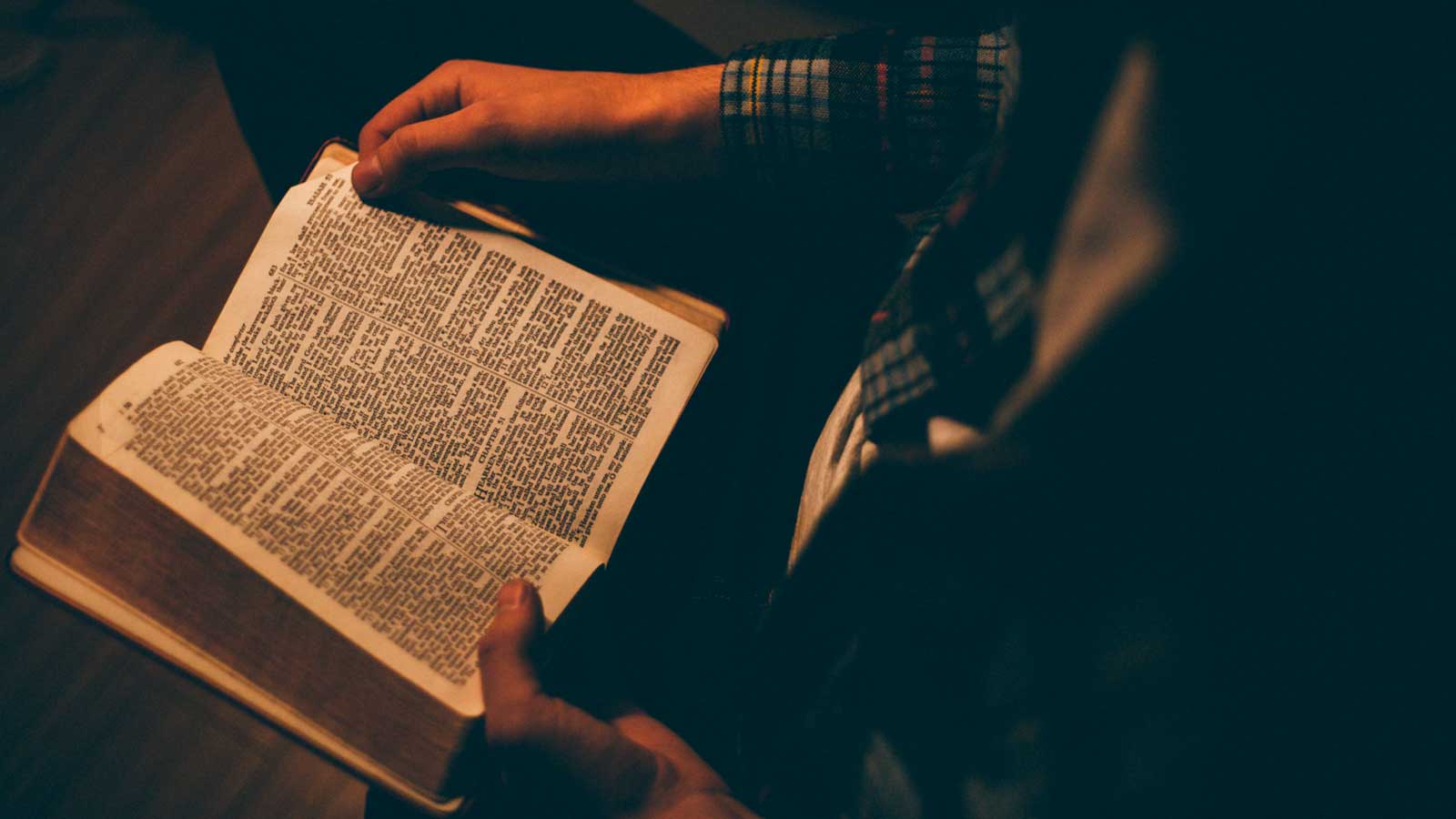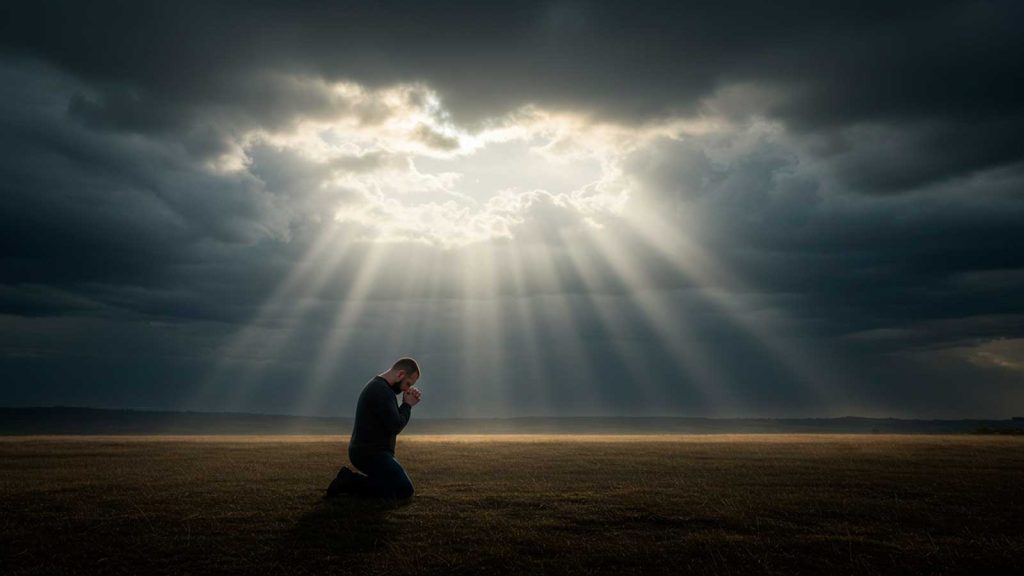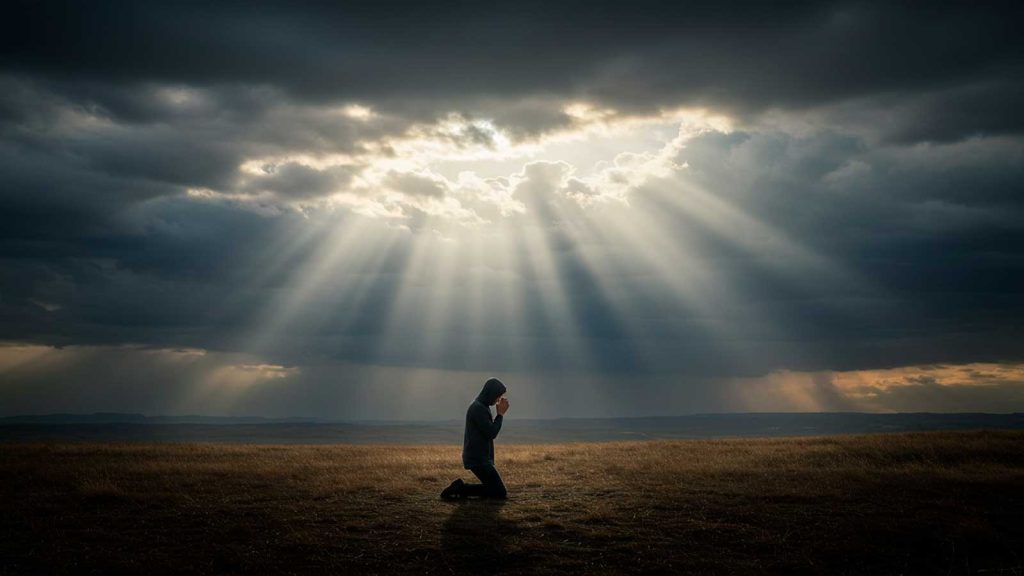Psalm 10
The Psalm 10 is one of the deepest and most moving texts in the Book of Psalms. It expresses the psalmist’s pain in the face of the apparent prosperity of the wicked and the suffering of the righteous. The message contained in this psalm is timely, powerful, and capable of touching hearts that long for justice in a world full of injustices.
Throughout this article, we will dive into the teachings of Psalm 10, reflect on its verses, and understand how to apply them to everyday life. You will also learn about the context in which it was written, the spiritual meaning of its words, and how this prayer can help you during difficult days.
Complete Psalm 10
1 Why, Lord, do you stand far off? Why do you hide yourself in times of trouble?
2 The wicked, in their arrogance, pursue the poor relentlessly; let them be caught in the snares they have devised.
3 For the wicked boasts of the desire of his soul; he blesses the greedy and renounces the Lord.
4 By the pride of his countenance the wicked does not seek God; all his thoughts are, “There is no God.”
5 His ways are always troubled; your judgments are far above his sight, and he despises your enemies.
6 He says in his heart, “I shall not be moved; for I shall never see calamity.”
7 His mouth is full of curses, deceit and fraud; under his tongue is mischief and wickedness.
8 He lurks in ambush in the villages; in hidden places he murders the innocent; his eyes are fixed secretly on the poor.
9 He sets snares for the vulnerable like a lion in his den; he sets snares to rob the poor; he robs the poor, catching them in his net.
10 He crouches, he lies in wait, that the poor may fall into his clutches.
11 He says in his heart, “God has forgotten; He has hidden His face, and will never see it.”
12 Arise, Lord. O God, lift up Your hand; do not forget the humble.
13 Why does the wicked blaspheme God? For he says in his heart, “You will not inquire into it.”
14 You see it, for You consider the labor and the pain; You will repay them with Your hand; the poor put their trust in You; You are the helper of the orphan.
15 Break the arm of the wicked and evil; seek out his wickedness until you find none.
16 The Lord is the eternal King; the nations will perish from His land.
17 Lord, You have heard the desire of the meek; You will strengthen their heart; Your ears will be open to them;
18 To render justice to the orphan and the oppressed, that the man of the earth may no longer prevail in his violence.

What is Psalm 10 and what is its purpose?
Psalm 10 is part of the collection of lament psalms, where the psalmist questions the absence of God in the face of the world’s wickedness. It begins with an anguished cry: “Why, Lord, do you stand far off?” This opening already shows us that it is a text of pain, but also of trust.
The purpose of Psalm 10 is to express the feeling of abandonment that often overcomes us, while reaffirming the faith that God, in His time, will arise to judge with justice.
The Structure of Psalm 10: A Cry Divided into Parts
Psalm 10 is divided into parts that help to understand its depth:
The Apparent Silence of God
In the first verses, the psalmist expresses his unease with the fact that God seems distant in the face of suffering. He observes the wicked acting with impunity and asks, “Why, Lord, do You remain far off?”
This passage is a sincere outpouring of emotion. Many times, in moments of pain, we feel exactly the same. God’s silence does not mean absence, but rather a time of waiting.
The Behavior of the Wicked
The psalm then describes the behavior of the wicked: they are arrogant, exploitative, deceitful, and they boast in their sins. They say in their hearts, “God does not care.” This description shows how evil seems to prevail.
Here, the psalmist uses strong and emotional language, highlighting the cruelty of those who act without fear of the divine.
The Cry for Divine Intervention
After describing the wickedness, the psalmist turns to God, crying out for justice. He asks that the Lord intervene, that He break the arm of the wicked, and that He put an end to the suffering of the innocent.
It is at this point that the tone changes: from indignation to trust. He acknowledges that God sees everything and that, in the end, He will bring about justice.
Trust in the Lord
In the final verses of Psalm 10, the tone is one of hope. The psalmist declares that God hears the cry of the oppressed, strengthens the heart of the righteous, and judges with fairness.
He concludes with the assurance that the Lord will bring justice to the orphan and the oppressed, dispelling the terror caused by the wicked.
Verse-by-Verse Explanation of Psalm 10
Verse 1
“Why, Lord, do you stand far off? Why do you hide yourself in times of trouble?”
Here the psalmist expresses his anguish in the face of God’s apparent absence. It is as if, in the moment of greatest need, the Lord were far away. This verse shows the honesty of the prayers found in Psalm 10: a sincere cry amid pain, coming from a heart that continues to seek God, even without understanding the divine silence.
Verse 2
“The wicked, in their arrogance, pursue the poor relentlessly; let them be caught in the snares they have devised.”
The psalmist denounces the violent actions of the wicked against the vulnerable. They act with arrogance, oppressing the poor without mercy. The prayer is that the evildoers be caught by the very snares they have set. It is a plea for justice within Psalm 10.
Verse 3
“For the wicked boasts of the desire of his soul; he blesses the greedy and renounces the Lord.”
This verse shows the moral deviation of the wicked: they take pride in their selfish desires, exalt the greedy, and completely reject God. Psalm 10 here highlights how sin hardens the heart, distancing a person from the divine presence.
Verse 4
“By the pride of his countenance the wicked does not seek God; all his thoughts are, ‘There is no God.’”
The wicked’s arrogance keeps him from seeking God. He acts as though God does not exist, living only for his own interests. Psalm 10 reveals that this is the root of injustice: a heart that neither fears God nor recognizes His sovereignty.
Verse 5
“His ways are always troubled; your judgments are far above his sight, and he despises your enemies.”
This verse shows that the wicked lives in constant defiance. He does not respect God’s judgments, which to him seem remote and insignificant. In Psalm 10, we see that the wicked is so confident in himself that he disregards any threat or correction.
Verse 6
“He says in his heart, ‘I shall not be moved; for I shall never see calamity.’”
The heart of the wicked is deceived by prosperity. He believes he will never face hardship, as if he were invincible. Psalm 10 denounces this false security of one who lives without fear, thinking himself above the consequences.
Verse 7
“His mouth is full of curses, deceit and fraud; under his tongue is mischief and wickedness.”
The wicked uses his words to hurt, deceive, and manipulate. His speech is poisonous and treacherous. Psalm 10 shows that the tongue of the unjust is a tool of destruction, full of malicious and perverse intentions.
Verse 8
“He lurks in ambush in the villages; in hidden places he murders the innocent; his eyes are fixed secretly on the poor.”
This verse paints a strong image: the wicked is like a predator, waiting in ambush to attack the innocent. He watches the weak, looking for opportunities to exploit. In Psalm 10, we see the active and premeditated perversity of the wicked against the defenseless.
Verse 9
“He sets snares for the vulnerable like a lion in his den; he sets snares to rob the poor; he robs the poor, catching them in his net.”
The psalmist compares the wicked to a lion ready to pounce. He carefully plans his attacks and takes advantage of the poor’s vulnerability. Psalm 10 continues to describe the cruelty of one who acts without mercy and without fear of God.
Verse 10
“He crouches, he lies in wait, that the poor may fall into his clutches.”
The wicked feigns humility or weakness, but it is only a strategy to capture the innocent. His disguised appearance hides dangerous intentions. In Psalm 10, this behavior reveals deep cunning and malice.
Verse 11
“He says in his heart, ‘God has forgotten; He has hidden His face, and will never see it.’”
The wicked convinces himself that God is not watching his actions. He believes that the Lord has forgotten or will not judge his evil deeds. Psalm 10 shows how distancing God from human consciousness leads to the illusion of impunity.
Verse 12
“Arise, Lord. O God, lift up Your hand; do not forget the humble.”
Now the psalmist cries out for divine action. He asks that God arise and intervene on behalf of the humble. Psalm 10 shifts from describing evil to a fervent prayer for justice and divine care.
Verse 13
“Why does the wicked blaspheme God? For he says in his heart, ‘You will not inquire into it.’”
The wicked’s blasphemy is portrayed as a direct provocation to God. He believes that the Lord will not scrutinize or judge him. In Psalm 10, this kind of thought is presented as dangerous and illusory.
Verse 14
“You see it, for You consider the labor and the pain; You will repay them with Your hand; the poor put their trust in You; You are the helper of the orphan.”
Here the psalmist affirms with faith: God sees everything. He observes the suffering of those in pain and repays with justice. The poor trust in God, and the orphan finds in Him a defender. Psalm 10 now becomes a hymn of hope and trust.
Verse 15
“Break the arm of the wicked and evil; seek out his wickedness until you find none.”
The request is direct and bold: may God destroy the power of the wicked and put an end to his evil. The “arm” here symbolizes strength and dominion. In Psalm 10, divine justice is seen as complete: leaving no trace of injustice.
Verse 16
“The Lord is the eternal King; the nations will perish from His land.”
This verse reaffirms God’s sovereignty. He reigns eternally, and no people or unjust system can withstand His rule. Psalm 10 shows that in the end, the Lord will triumph over all evil.
Verse 17
“Lord, You have heard the desire of the meek; You will strengthen their heart; Your ears will be open to them;”
The psalmist acknowledges that God listens to the humble. He comforts the troubled hearts and is always attentive to sincere prayers. Psalm 10 reminds us that the Lord is near those who seek Him with meekness and faith.
Verse 18
“To render justice to the orphan and the oppressed, that the man of the earth may no longer prevail in his violence.”
The closing of Psalm 10 is a powerful declaration: God intervenes to protect the most vulnerable. Divine justice aims to put an end to violence and restore peace. The psalmist ends with hope and trust in the Lord’s actions.

Reflection: What Can We Learn from Psalm 10?
Psalm 10 teaches us to be sincere in our prayers. We do not need to hide our doubts or our pain from God. He invites us to trust, even when everything seems lost.
This biblical passage is a reminder that divine justice never fails. Even if it seems delayed to human eyes, the Lord sees every tear and every injustice committed.
Moreover, the psalm shows the importance of empathy with those who suffer. We must be the voice for those who have none, just as the psalmist was.
The Power of Prayer in Times of Injustice
Prayer as an Expression of a Troubled Soul
Psalm 10 is a powerful testimony of how prayer becomes a shelter in the midst of a storm. Unlike formal and mechanical prayers, here we see a living, intense, and deeply human prayer. The psalmist does not hide his pain, his indignation, or his doubts. He presents himself before God with a heart torn by injustice and the apparent absence of the divine.
When Faith is Demonstrated in Pain
This type of prayer teaches us that true faith is not made up of pretty words, but of sincerity. When we face injustice, pain, or suffering, it is natural for the heart to question, to cry, and even to feel alone. However, as we learn from Psalm 10, the most important thing is to keep praying, to keep seeking God’s presence even when the soul is in pieces.
Praying is Spiritual Resistance
Praying in times of injustice is an act of spiritual resistance. It is an affirmation that, even when everything seems out of control, we believe that there is a just God who sees, hears, and acts. In this context, prayer is also a cry for help, a request for intervention, and a declaration that we trust that evil will not have the final word.
Inner Transformation Through Prayer
Furthermore, prayer transforms the one who prays. It not only changes situations but also strengthens the heart. When we pour out our souls before God, as the psalmist did, something inside us is rearranged. Despair begins to give way to trust, and pain transforms into hope. Psalm 10 clearly shows this emotional and spiritual turnaround: it begins with a questioning cry (“Why, Lord, do you stand far off?”) but ends with a firm declaration of faith (“You have heard the desire of the meek…”).
Sincere Prayer is an Act of Courage
Therefore, prayer in difficult times is not a sign of weakness, but of courage. It is a reminder that there is still hope because there is a God who reigns above all human wickedness.

God is a Refuge for the Oppressed
God Pays Attention to Those Who Suffer
One of the most comforting teachings of Psalm 10 is the revelation that God cares for the oppressed. Contrary to what the wicked believe—that God is absent or indifferent—the psalm asserts with conviction: God sees, hears, and acts on behalf of the weak.
God’s Special Care for the Vulnerable
The psalmist makes it clear that God is a refuge for the orphan, for the humble, and for all those who have no voice or protection in this world. He is the safe shelter for those who are exploited, despised, and persecuted. This aspect of Psalm 10 is deeply relevant today.
A God Who Strengthens Hearts
The image presented in the psalm is of a God who not only listens but also strengthens the hearts of the meek, as we read in verse 17: “Lord, You have heard the desire of the meek; You will strengthen their heart; Your ears will be open to them.”
Divine Justice: A Promise That Brings Hope
The promise of Psalm 10 is clear: the humble will not be ignored. Those who are invisible to the eyes of the world are seen by God with special care. And more than seeing, He commits to acting: “To render justice to the orphan and the oppressed, that the man of the earth may no longer prevail in his violence” (verse 18).
A Refuge That Remains Steadfast
This certainty can sustain our faith in difficult days. Knowing that God is the defender of the weak gives us the confidence to carry on, even when the world seems unjust. He stands beside those who suffer, and in due time, His justice will prevail. Psalm 10 invites us to trust in this truth and to seek Him as our constant refuge.
Practical Applications of Psalm 10 for Everyday Life
Applying the teachings of Psalm 10 to everyday life means:
- Not remaining silent in the face of injustice
- Praying sincerely, even amid pain
- Trusting in divine justice
- Caring for the weak and humble
- Having patience during God’s moments of silence
These attitudes can transform the way we face challenges.
Does Psalm 10 Still Apply Today?
The answer is yes! Psalm 10 is extremely relevant. We live in a world where injustice often seems to prevail. But just as in the time of the psalmist, God still reigns.
This psalm serves as a spiritual anchor for days when we feel that evil is winning. It reminds us that above all is the Lord, who sees everything.
The Importance of Studying the Psalms
Studying psalms like Psalm 10 helps us grow spiritually. They are living prayers, filled with emotion, faith, and lessons. When we read and meditate on these texts, our faith is strengthened.
Moreover, the psalms teach us how to pray. They are a true school of prayer, where we learn to speak to God with an open heart.
Psalm 10 and Other Similar Psalms
The theme of injustice and trust in God also appears in other psalms. Here are some examples:
- Psalm 37: “Do not be enraged by those who do wrong…”
- Psalm 73: “I almost stumbled when I saw the prosperity of the wicked…”
- Psalm 82: “Defend the cause of the poor and the orphan…”
These texts reinforce the same message as Psalm 10: justice will come.

FAQ about Psalm 10
What Does Psalm 10 Mean?
It is a cry against injustice and a plea for divine intervention. It shows the suffering of the righteous and the apparent impunity of the wicked, yet it ends with hope.
Who Wrote Psalm 10?
Its authorship is attributed to David, although it is not explicitly mentioned in the title. The style and theme are common in the Psalms of David.
Is Psalm 10 Part of a Larger Collection?
Yes, many scholars believe that it forms a unit with Psalm 9, originally being one acrostic psalm (with verses following the letters of the Hebrew alphabet).
How Can Psalm 10 Be Applied in Life?
By using it as a basis for sincere prayers, for reflecting on God’s justice, and for renewing trust even in difficult times.
Can I Use Psalm 10 as a Prayer?
Absolutely! Reading and praying Psalm 10 is a powerful way to draw closer to God and lay your heart’s anguish before Him.
READ ALSO:
- Psalm 9: A Message of Justice and Hope
- Psalm 6: A Cry for Hope Amidst Anguish
- Psalm 8: The Majesty of God and the Value of Human Beings
FOLLOW US ON FACEBOOK
FOLLOW US ON PINTEREST